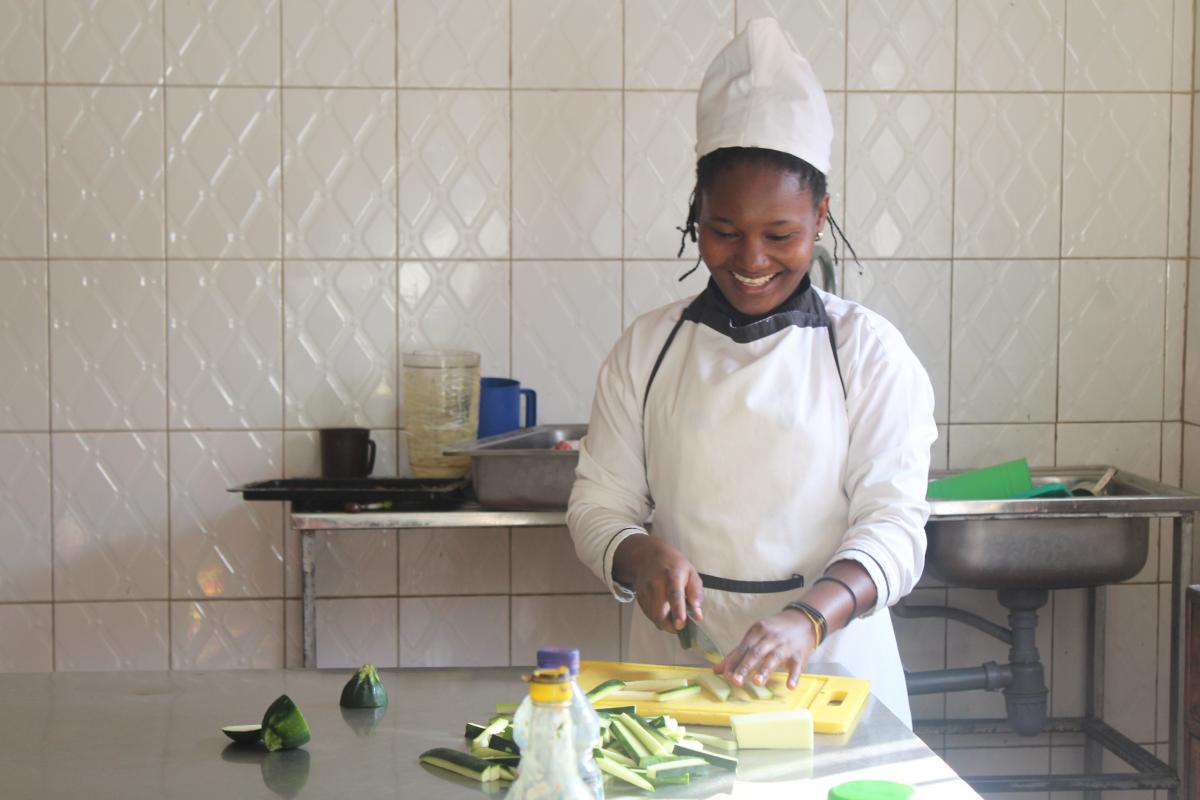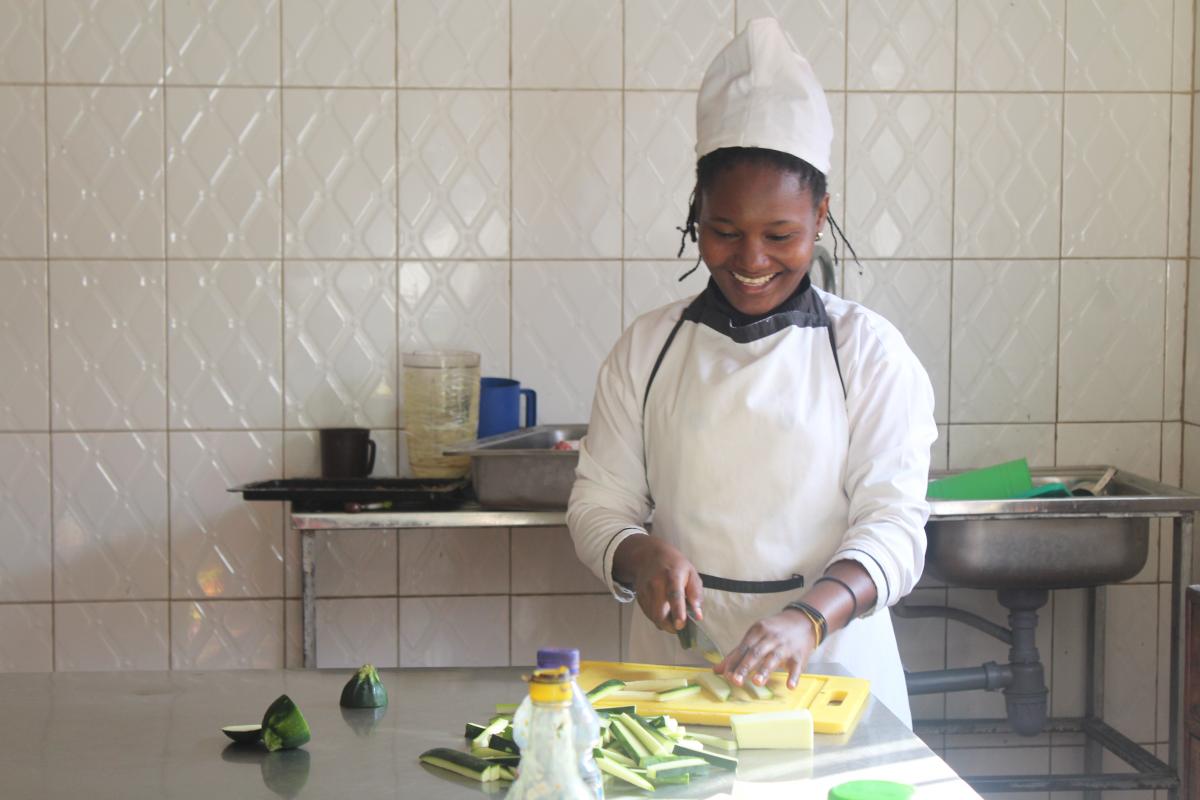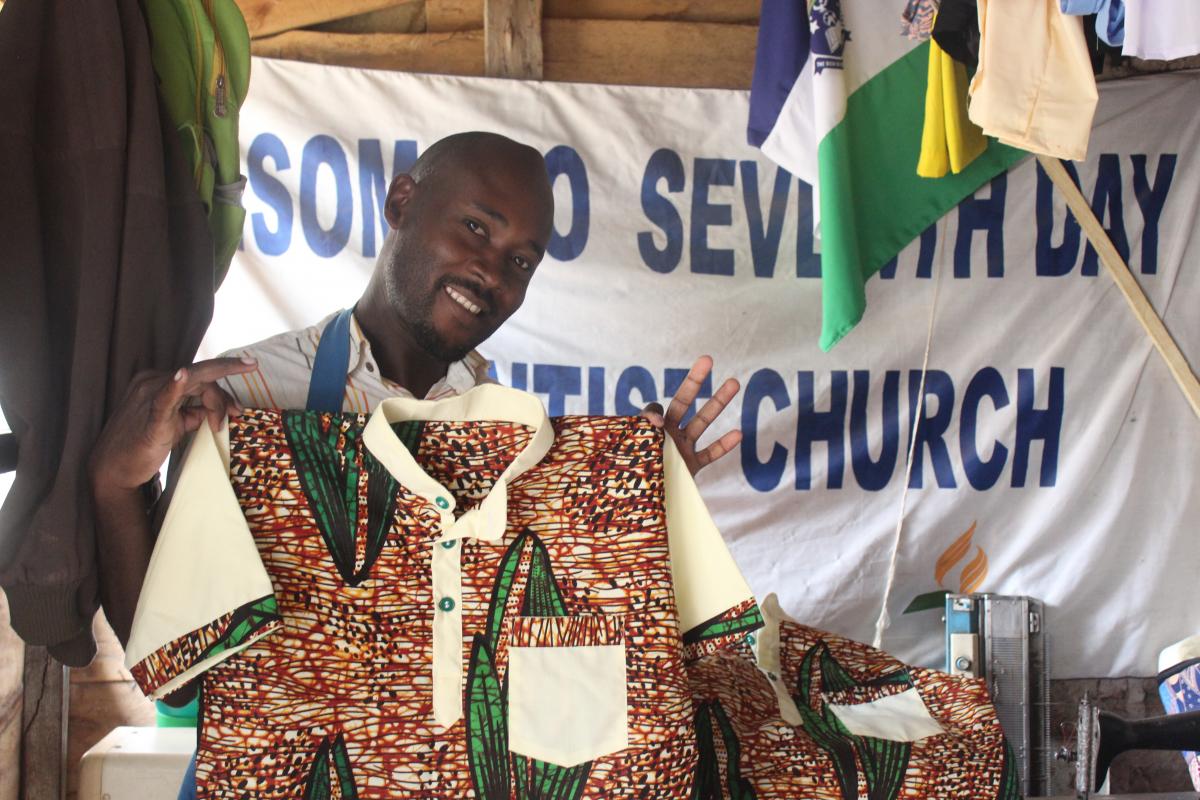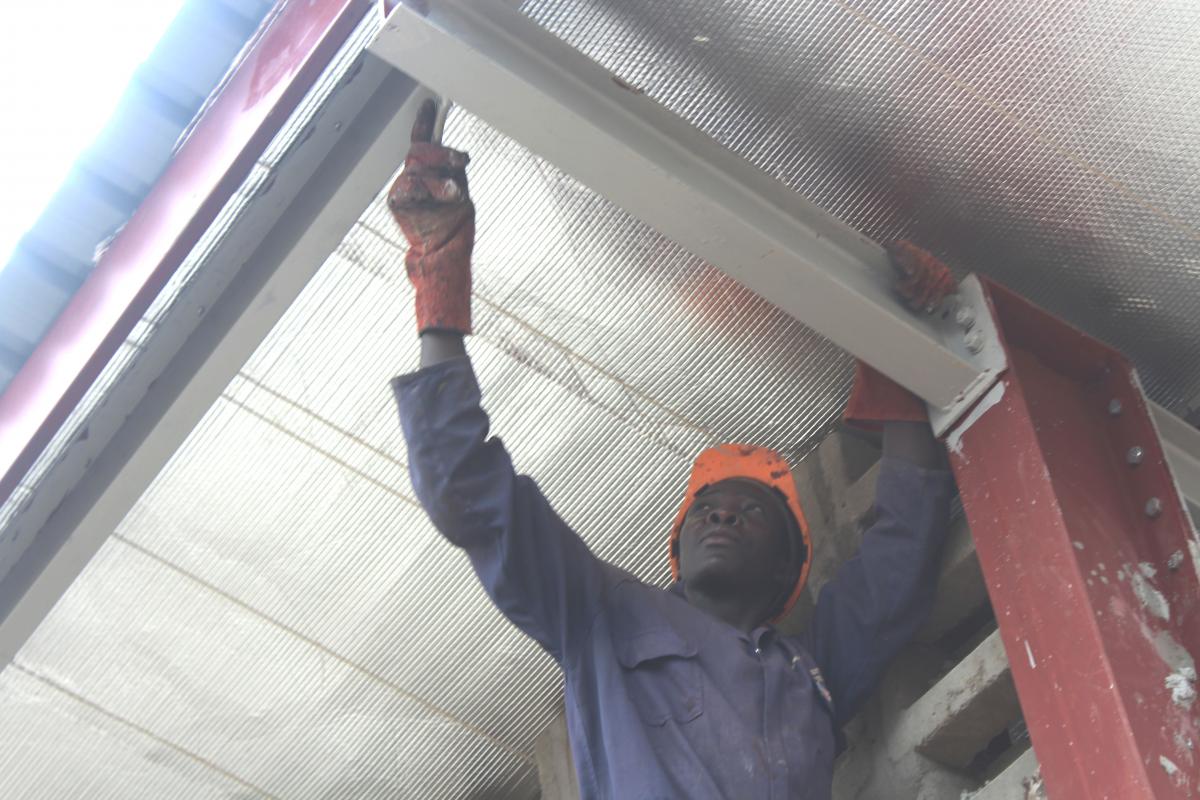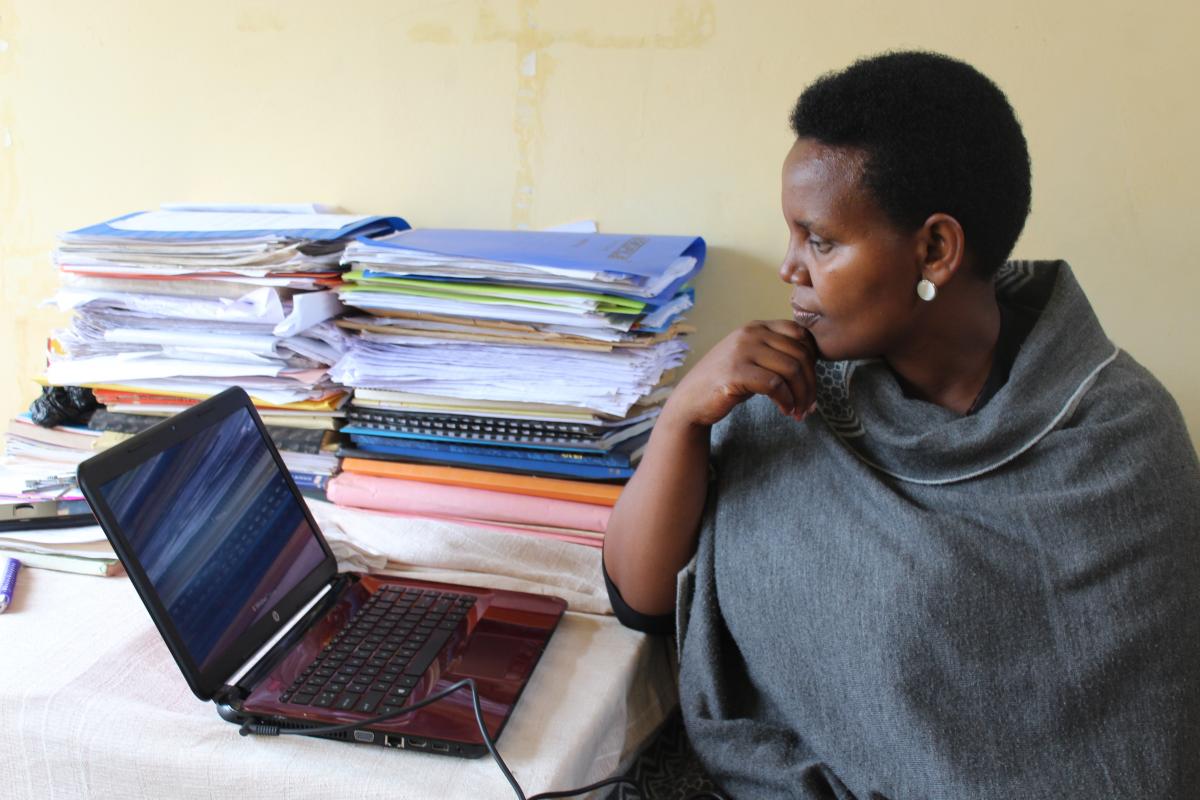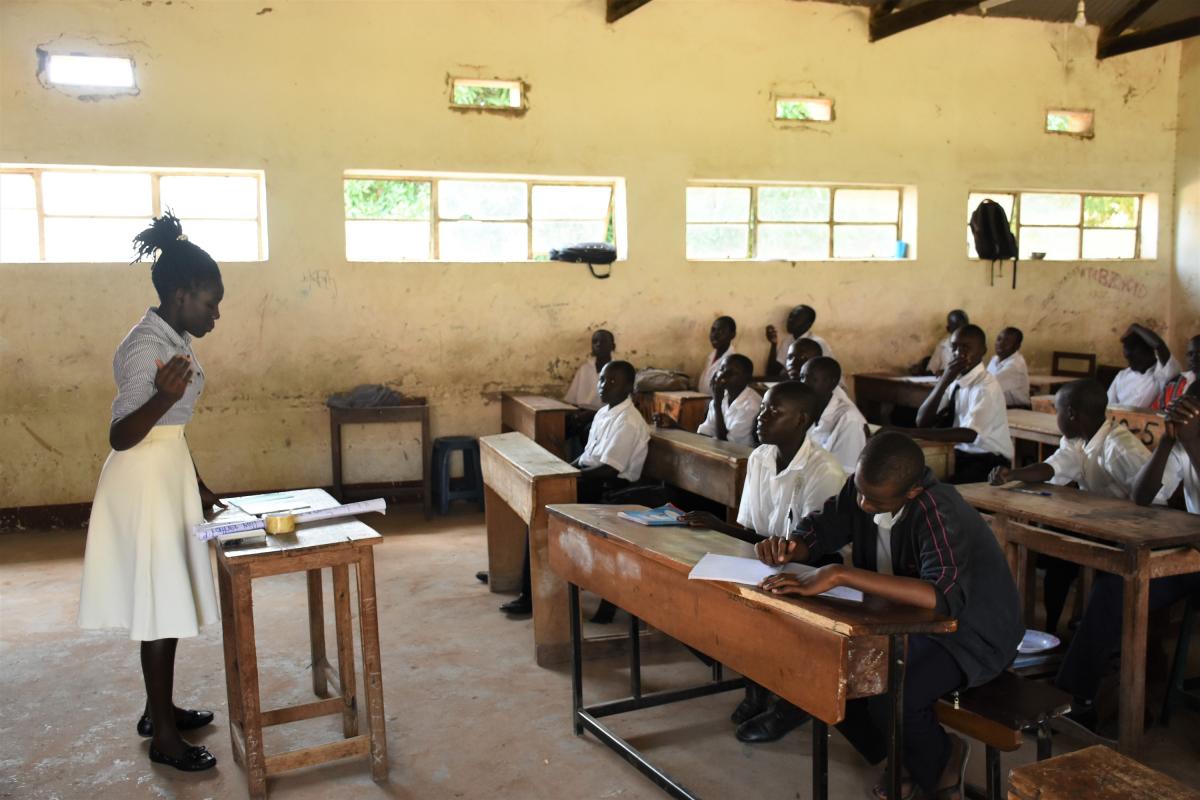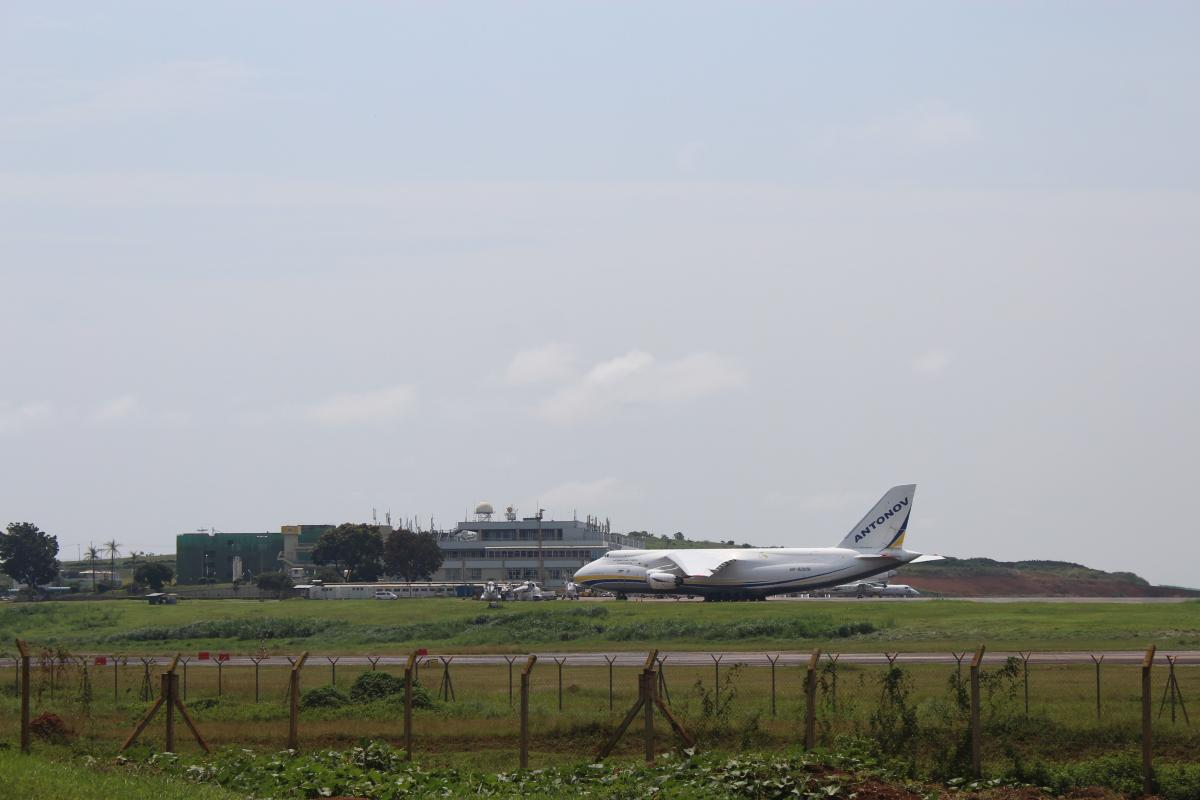Search
Viewing 2310 to 2325 of 3124 news
-
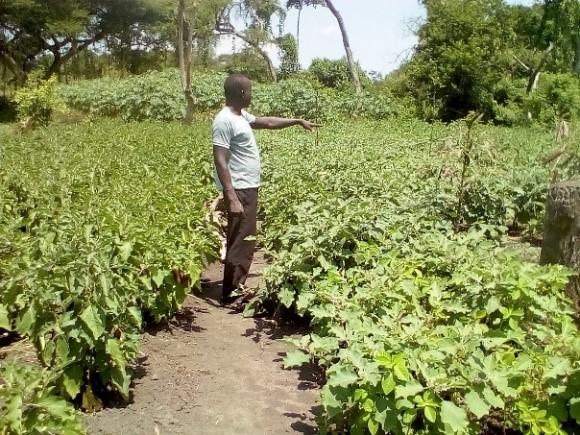
A young man's journey to an inspiring world through vegetable growing
Ibrahim OGARAM | 02/09/2019
My name is Butele Mansur. Iam 26 years old and from Rubangabini village, Maaji parish, Ukusijoni sub county, Adjumani district. In 2017 when CEFORD came to my village for community sensitization about Support Programme to the Refugees and Host Communities in Northern Uganda project, I fully attended the meeting of the programme. Thereafter, I took interest to join the group formed as Tandrupasi Farmer Group with membership of 25 members. Out of which 11 males and 14 females and whose main source of income is agriculture. I attended four months of training with CEFORD on participatory agro enterprise development and village savings and loan association. This greatly opened our minds on farming as a business while ensuring both nutrition and food security in our individual households. Through the intensive training, I was able to move from the traditional ways of my great grandparent’s system of farming to a modern farming system. This has greatly led to increased yields and better quality of produce at the same time in my household. I also learnt how to do enterprise selection using the cost benefit analysis tool and keep good records as it is key for any successful agricultural venture. Through the VSLA trainings, the saving culture and expenditure discipline was instilled in me. I started saving with the group.But as time moved on, I expanded my gardens and started realizing much more incomes and decided to save also with Obongi saving cooperatives. It is only through the intervention of CEFORD that, I learnt about dry farming. So I currently venture into cabbage growing on a large scale, tomatoes and egg plants. Despite the challenge of prolonged droughts in Adjumani district, I have managed to establish vegetable gardens along all season streams and also acquired a solar powered irrigation system from solar now so that I can constantly produce vegetables in dry season when the market demand is high and supply is low. For this year, 2019, I planted cabbage on an acre of land in the first season. I spent 38,500 Uganda shillings on pesticides and market dues. I earned 927,000 Uganda shillings from the sale of vegetables most of which was bought from the garden. Selling produce in the market has greatly reduced the expenses, I would have incurred such as market dues and transportation charges. CEFORD provided us with naro cass 1 cuttings in 2017 as startup package. I took good care of my garden. My biggest achievements is my ability to supply farmers with 105 bags of naro cas 1 cassava stocks, each at 35,000 Uganda shilling. I will expand my vegetable gardens, buy another irrigation pump and buy my wife a beautiful dress. I thank European Union for their support and CEFORD for the advisory services and linking me to input dealers that has positively impacted on my life. My passion for the experience about farming was inherited from my ancestors. Compiled By: Michael Alumai, Adjumani District. Community facilitator, CEFORD
-
HANDS FOR FOOD
Elizabeth NAKIRU | 26/08/2019
The sun is shining brilliantly pouring over the streets of Hoima town as we drive and park at court view hotel. The manager of court view hotel welcomes us warmly and later introduces us to Joselyn Ayisiza a 21 year old trained cateress supported by Enabel through hands on skills training that took place at millennium vocational school in Masindi. Joselyn heard about the program from a friend while working as a mobile money agent in a kiosk in Masindi. She travelled to Hoima where she applied, did interviews and got enrolled for the Pastry and Catering course. One year later, Joselyn has skills in baking, preparing both local and international cuisines and other delicacies. She got employment soon after completing the course at court view hotel and earns 200,000shs. Per month. She is able to pay her own rent, save and also cater for her personal needs since getting the job seven months ago. She was given a startup kit by Enabel which she plans to use to start up her side business of setting up an eatery when she saves enough capital to enable her dream come true. The training also improved her social interactions to which she says,”I made good influential friends who are helping me.” Her manager says, “She is a very hardworking girl who is promising.” Joselyn is one of the many youth who have been trained in skills to improve their livelihood and employability in a skills thirsty economy.
-
HANDS FOR FOOD
Elizabeth NAKIRU | 26/08/2019
The sun is shining brilliantly pouring over the streets of Hoima town as we drive and park at court view hotel. The manager of court view hotel welcomes us warmly and later introduces us to Joselyn Ayisiza a 21 year old trained cateress supported by Enabel through hands on skills training that took place at millennium vocational school in Masindi. Joselyn heard about the program from a friend while working as a mobile money agent in a kiosk in Masindi. She travelled to Hoima where she applied, did interviews and got enrolled for the Pastry and Catering course. One year later, Joselyn has skills in baking, preparing both local and international cuisines and other delicacies. She got employment soon after completing the course at court view hotel and earns 200,000shs. Per month. She is able to pay her own rent, save and also cater for her personal needs since getting the job seven months ago.She was given a startup kit by Enabel which she plans to use to start up her side business of setting up an eatery when she saves enough capital to enable her dream come true. The training also improved her social interactions to which she says,”I made good influential friends who are helping me.” Her manager says, “She is a very hardworking girl who is promising.” Joselyn is one of the many youth who have been trained in skills to improve their livelihood and employability in a skills thirsty economy.
-
RAYS OF PASSION IN ART
Elizabeth NAKIRU | 24/08/2019
Kojo John is 37 years old, a graduate of art and design whose life has been driven by his passion for art work designs and material. He is from Kitumba trading center in Kabarole district where he runs a small but functional art and design workshop called Legacy. This is where he was practicing his learned skills into action after graduating in 2010 with no well-paying job despite sourcing for one over the years. He settled with starting his own workshop but the skills he had were limited and out dated. Therefore he didn’t earn as much as he would have loved until he heard about an opportunity to do a hands on skills training in Tie and Dye and Embroidery from a radio station. The training was sponsored by Enabel where Kojo and his colleagues were taught new art and design skills while practicing hands on concurrently. “The new techniques in the skill excited me and helped me polish the ones I already had which am using now in my workshop,” says Kojo. The new techniques he acquired and now practices are text printing, embroidery, labelling, tie and dye. Using the above skills he is able to make branded shirts, clothes, overalls, overcoats, aprons, badges, tie and dyed clothing material.Kojo also trains other colleagues who are interested at his workshop besides working on the orders he receives. “The orders are seasonal but I get at least one every month and they are worth as much as 1.5M each which is good for me,” reveals Kojo. He has invested his savings into setting up commercial houses, piggery and poultry keeping in his home village. Kojo is married to one wife and has four children whom he ably supports now that he has hands on skills which have boosted his business and employable skills. Over 2000 Youth in the Albertine Rwenzori region have been trained in various skills to improve their livelihood and employability levels in their region.
-
I MADE THE RIGHT DECISION
Elizabeth NAKIRU | 24/08/2019
Adungo Mark is a graduate of St Daniel Comboni Vocational Institute, he is one of the builders at the construction site near the institute. He steadily climbs the ladders up to the top part of the building in a bid to finish his painting of the upper roof. Mark was raised by his paternal uncles whom he lived with in turns during and after school holidays. He has no clue about his father’s whereabouts but he is determined to have a better life. Luckily enough he had a sponsor who facilitated his stay in school and later convinced him to do vocational training after senior four. ”I had never wanted to join a vocational school at first,” said mark. “I remained at home for two weeks after the term opened but decided to go to St. Daniel Comboni vocational training institute and now I think I made the right decision,” mark revealed. He then went and enrolled for a skills training course in automotive mechanics which he completed successfully and graduated in 2018. He earns up to ninety thousand shillings a day from construction work and saves about thirty thousand shillings since he has a responsibility of paying his young sisters fees and helping his aunt in the village with some money to cultivate their land. Mark has dreams of upgrading his education to become a mechanical engineer after he saves enough money to finance himself. ”I would like to study more and upgrade so that I become a mechanical engineer one day.” The training was implemented under the Skills Development Fund, operated by the Belgian development agency Enabel under its Support to the Skilling Uganda Strategy, and funded by Irish Aid. The aim of the Skills Development Fund is to equip young Karamojong with employable skills for the readily available job market.
-
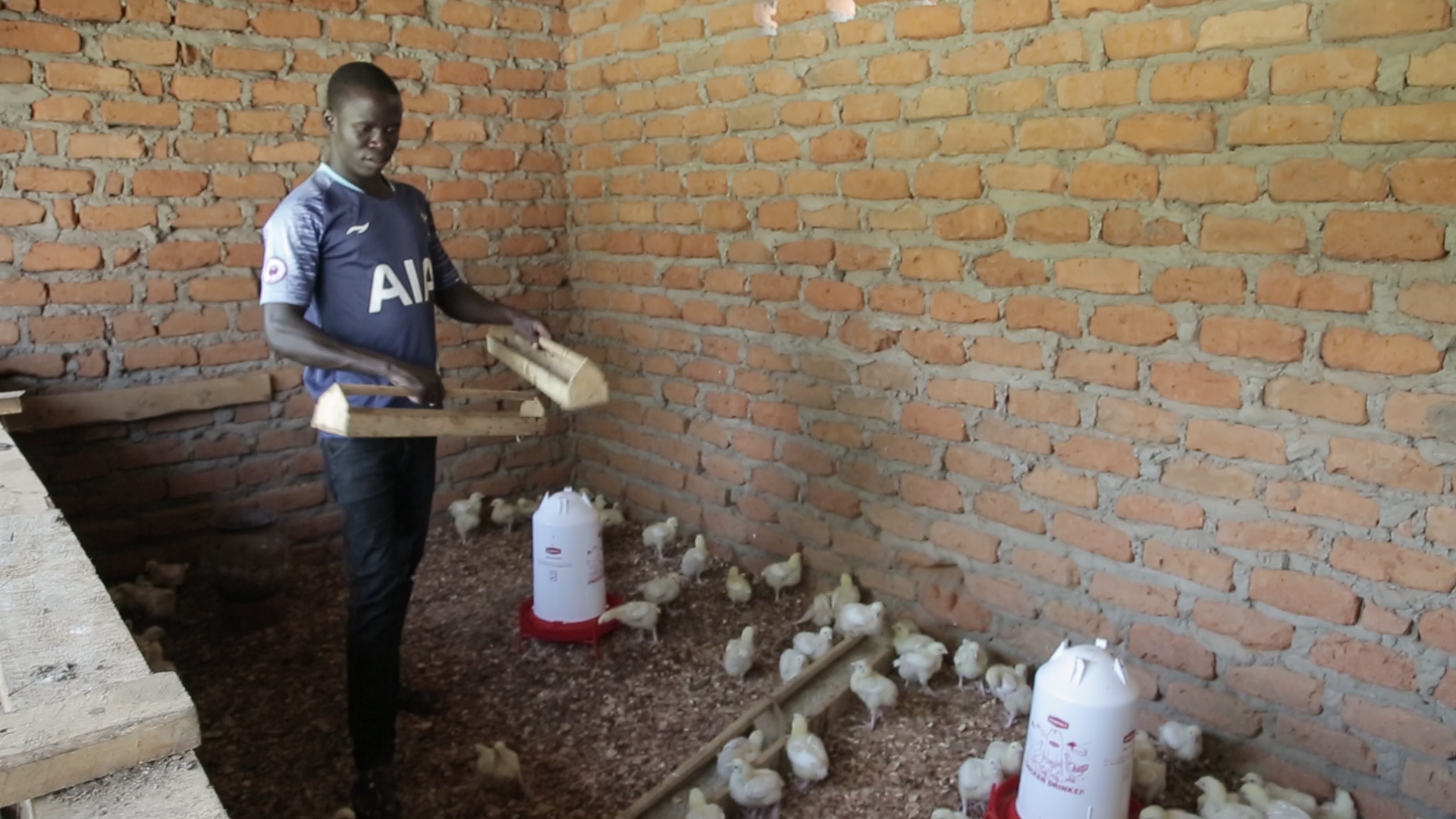
AJUMA,THE FUTURE OF PULTRY BUSINESS
Elizabeth NAKIRU | 24/08/2019
. Ajuma Philip is a 22 year old who at first sight is very calm, soft spoken and welcoming. He shakes our hands with a firm grip and a bright smile as we exchange pleasantries on our first interaction. Ajuma quickly introduces himself as the proud owner of a newly built poultry house, he proceeds to show us his now second set of chicks (broilers) he bought recently to breed.He is from Jiakoyia village where he was a former peasant depending on gardening as his sole income source. He heard about skills training in Flamino Vocational Institute where he applied and got admitted for poultry farming for 6 months. It is during the training that he got life skills like saving, business management, and conflict management. He applies these skills to his growing poultry business and successfully sold off his first set of 180 grown broilers at 15,000 to 20,000 shs each. ’There’s ready market for my products like hotels, restaurants and households. So I am very happy with my business, it is also easy to manage,’ said Ajuma. His second set of chicks is already in place as he’s caring for them with the availability of poultry equipment like disinfectants, feeding troughs, feeds, vaccinations and drinking troughs which he bought for himself soon after his first big sale of chicken. Ajuma further explained that he is planning to upgrade his education and skills with the savings he is making from his poultry venture. Having had no skills at all with little or no income, he said, “We as youth need vocational skills instead of being idle at home or drinking alcohol and depending on our families when we cannot find jobs due to lack of skills…”
-
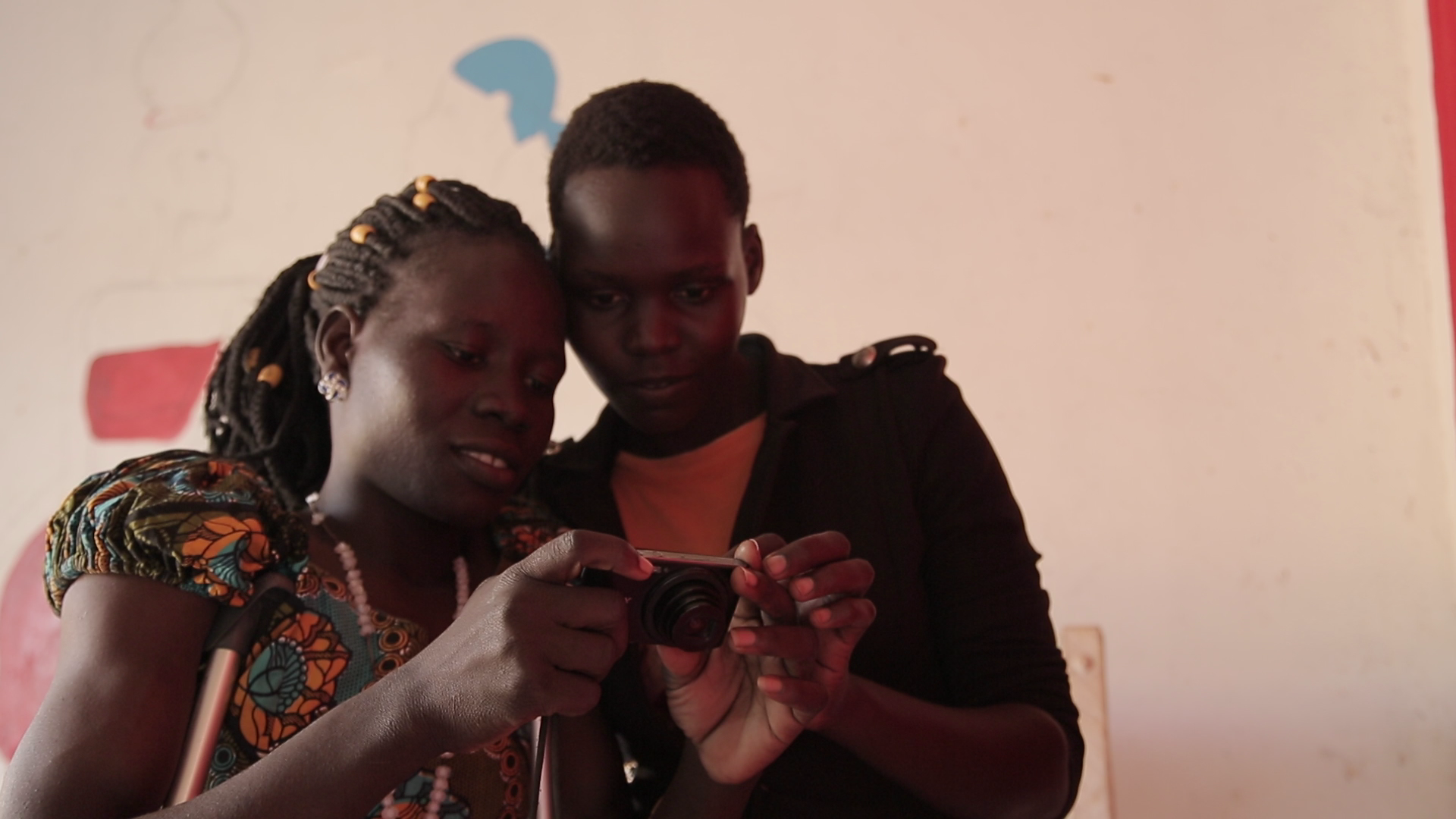
BEATING THE ODDS OF DISABILITY
Elizabeth NAKIRU | 24/08/2019
Maia Doreen Buni and Ababiku Jackeline are residents of Pakele Sub County in Arua district in Northern Uganda. They looked for jobs for over two years without success simply because they did not have any skills and they are also incapable of doing some jobs due to their physical disabilities. Their search for jobs went as far as South Sudan in a desperate attempt to improve their lives. Their determination paid off at a later stage when they heard about enrollment for skills training in Northern Uganda by Cheshire Uganda supported by Enabel. They both applied and enrolled for Computer Application Training for six months at Amelo Technical Institute in Pakele. They successfully completed the course and were given start up kits of laptops, Jackeline was also given walking clutches to ease her movements while studying and working. Doreen was aided to get treatment for her disability.They were both retained at Geo arts studio where they run a computer business in printing, designing, photocopying, binding, producing passport photos among others on their own with little or no supervision from the owner of the business. Both Doreen and Jackeline defied the norms of society and excelled in a male dominated environment and course despite their physical degeneration. They also acquired basics of business management. They adopted a saving culture from their training thus able to save some money off their weekly earnings of 15000shs and help with their own families to provide basic needs like soap, sugar, books for their siblings to mention but a few. ‘Iam grateful to Cheshire Uganda and Enabel for giving me a chance to have a better life,’ said Jackeline. ‘I didn’t think I was ever going to be employed by anyone because of my disability but now I have skills and I got employed,’ said Doreen.
-
Computer use training easing work at NTC Kabale
Rachael AYEBALE | 20/08/2019
“I have a laptop, but don’t know how to use it,” Ariyo Marysent, a lecturer at NTC Kabale intimated before she attended the ICDL training organized by the Support to the Development of Human Resources (SDHR) project. So did Turyahikayo Hope, who didn’t know how to use a computer, Mercy Kiconco who didn’t know how to effectively use excel and tally and yet is the senior accounts assistant at the college, and Annet Komunda who had a desire to learn management of information systems among other areas. All this is history for these staff and many others.“This training has changed my life,” Marysent mentions. “I can now use my computer to prepare presentations on PowerPoint, send emails, enter marks in excel and input a formula, unlike before. This training was very enriching,” she adds“We even now don’t have to enter the class and dictate notes. I type my information, print it out and give handouts to students,” adds Annet. “I used to sit up all night and use a calculator to total up sums from the accounts. Now it is as easy as can be. I simply enter the data in an excel sheet, input a formula, and all results come automatically,” Mercy says.“Thanks to this training, I now have ample time for my family. I no longer hustle with adding up and balancing accounts manually,” Mercy adds. As the college embraces active learning and teaching methods, that incorporates the use of ICT to enhance knowledge transfer, the training came in quite handy for staff.
-
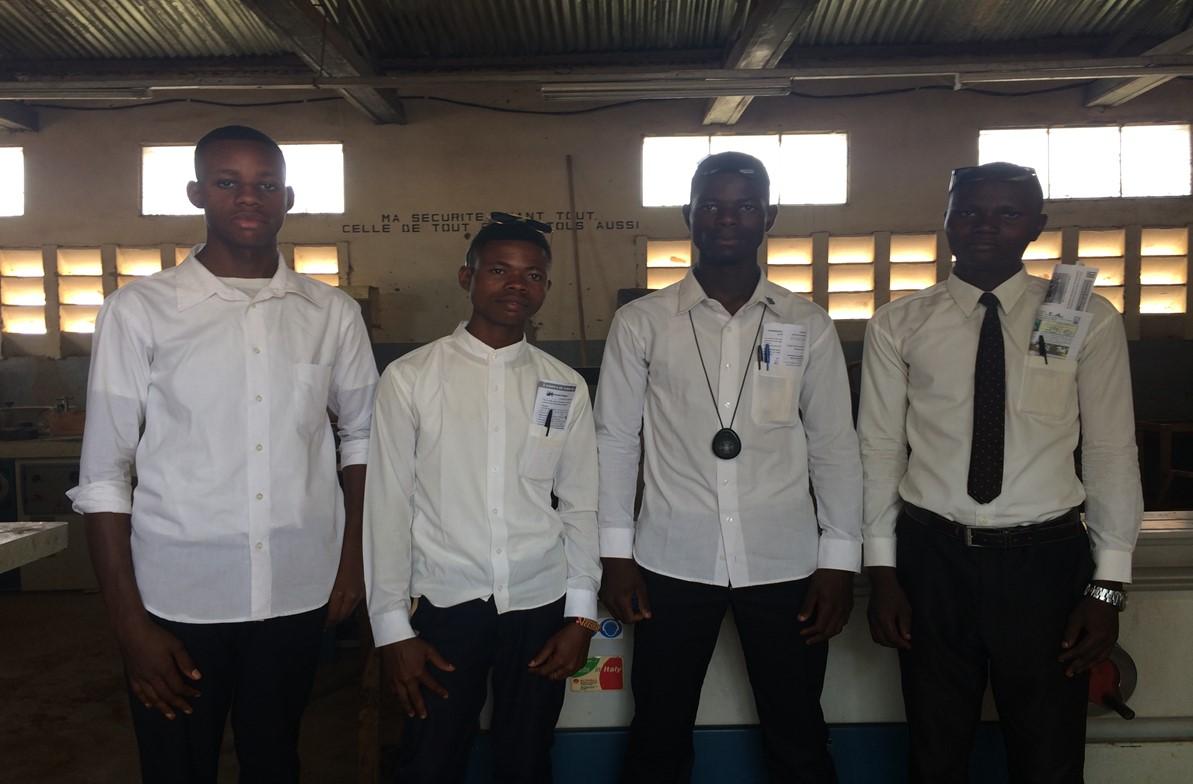
100 % DE REUSSITE A L’EXAMEN D’ETAT POUR LES ELEVES APPUYES PAR Enabel
Grâce MALI FAIDA | 12/08/2019
Dans le cadre de l’amélioration de la qualité de l’ETFP en RDC les résultats obtenus sont réels.Pour la deuxième année consécutive les élèves apprenants des filières professionnelles et techniques (Agriculture Générale, Vétérinaire, Transformation alimentaire, Menuiserie et Mécanique Générale) appuyées par Enabel/EDUKOR au Kasaï Oriental et dans la Lomami ont toutes et tous réussis l’examen d’Etat en finalisant cette année scolaire 2018-2019 avec dans certains CDA des scores élevés dans leur province.Ce taux de réussite de 100% pour les élèves de ces filières est dû aux nouvelles approches innovantes introduites par EDUKOR dans les CDA (Centre d’Application) au travers des infrastructures construites, aux équipements didactiques installés dans les ateliers, aux ateliers d’A.G.R.( activités génératrices de revenus) opérationnels à la modalité de la formation en alternance en entreprises tout au long de leur cursus et aux renforcements des capacités des enseignants permettant aux jeunes apprenants d’acquérir les compétences techniques et professionnelles de haut niveau nécessaires et en adéquation avec leurs futurs emplois qui leur mènera vers des emplois en tant que salariés ou vers l’entrepreneuriat.Félicitations à nouveau cette année aux élèves, aux enseignants, aux préfets, aux familles et à l’équipe EDUKOR des CDA « ITP MAKALA, ITP MAZARELLO, ESGTK et ITAV NGANDAJIKA » pour ces excellents résultats.
-
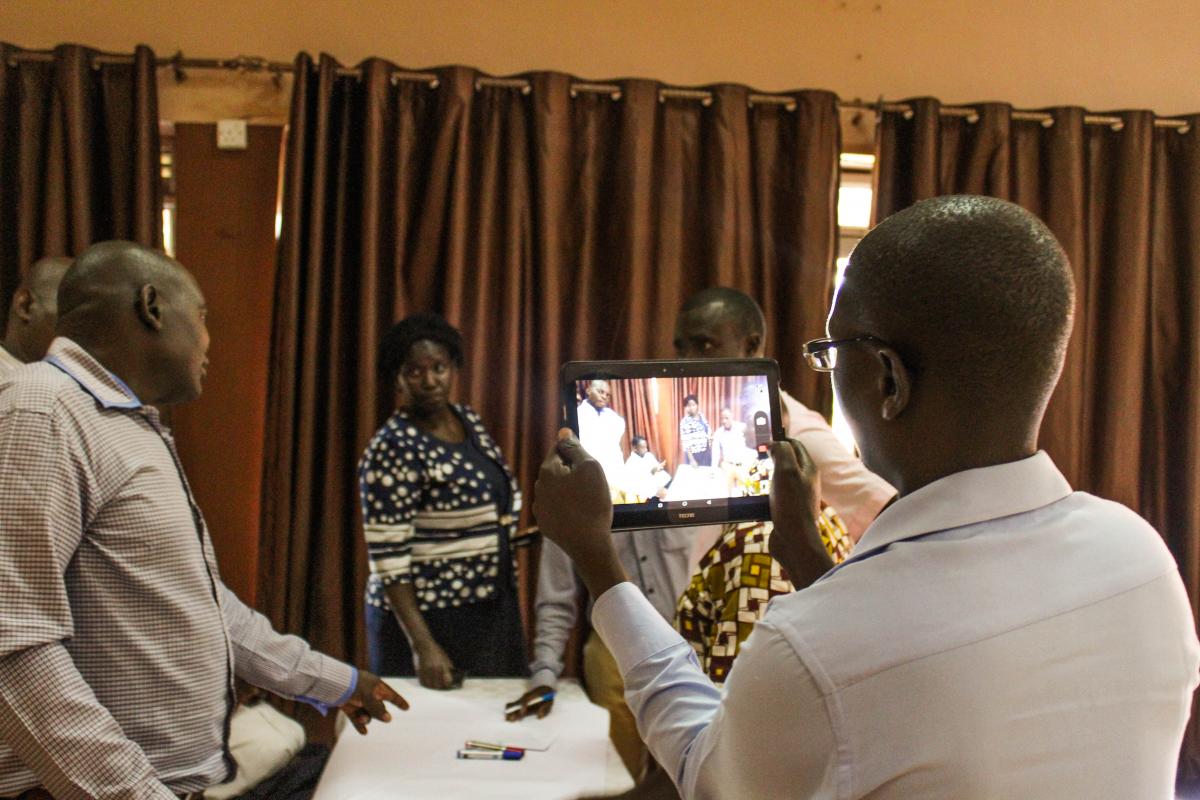
National Teachers' Colleges Get ICT Champions
Dorothy KYAMAZIMA | 08/08/2019
“The greatest part of my work revolves around the use of technology but most lectures within the college would not be in a position to say the same about their work,” says Olara James, an ICT officer that supports the college IT laboratory. And now, he is one of the 5 selected ICT Champions supporting the integration of ICT in Teaching and Learning at National Teachers’ College Unyama. So far, each of the five colleges has appointed 5 ICT champions specifically for this purpose. Learning in the National Teachers’ Colleges is changing and one of the catalysts behind this is the introduction of Information and Communication Technology to the teaching and learning dynamic. For the most part, the colleges have operated with minimal ICT support in past which has greatly affected the quality of learning in the classroom. Lecturers mainly relied on the traditional means of teaching, and as this was the norm, it did very little to create learner-centred environments and to prepare their students to step into the twenty-first century. With support from Enabel, the Teacher Training Education project has facilitated in more ways than one, the integration of ICT in Teaching and Learning. This is because we believe that technology does not only aid teaching but can revolutionize the learning process. Currently, the purpose of the ICT champions is quite specific. To mentor fellow lecturers on how to incorporate ICT in their teaching process and to aid learners in the use of ICT tools. This can be done in through several ways. One of them is the use of internet aided research using computers within the college and the use of projectors to display content in a classroom. Among the ways to utilize ICT in the education process, is the use of video teaching. Through this process, lecturers access both offline and online video education resources in preparation for their lessons. A practise that is steadily growing in the NTCs.According to Kilama Emmy, another ICT champion and lecturer at NTC Unyama, this practice capturers learners’ attention and has made it easier to illustrate ideas and concepts in a classroom. In relation to video in teaching and learning, is the use of video in microteaching. Through microteaching lessons, lecturers and teacher-trainees review video recordings of teaching sessions to get constructive feedback and make improvements to their teaching technique. Another practice that has significantly strengthened the competencies of teachers graduating from the NTCs. In order to build on the NTC’s capacity to utilize ICT in the teaching and learning, the project has trained a total of 25 appointed ICT champions across all the five colleges on the use of video in teaching and learning and strengthened their mentorship skills.
-
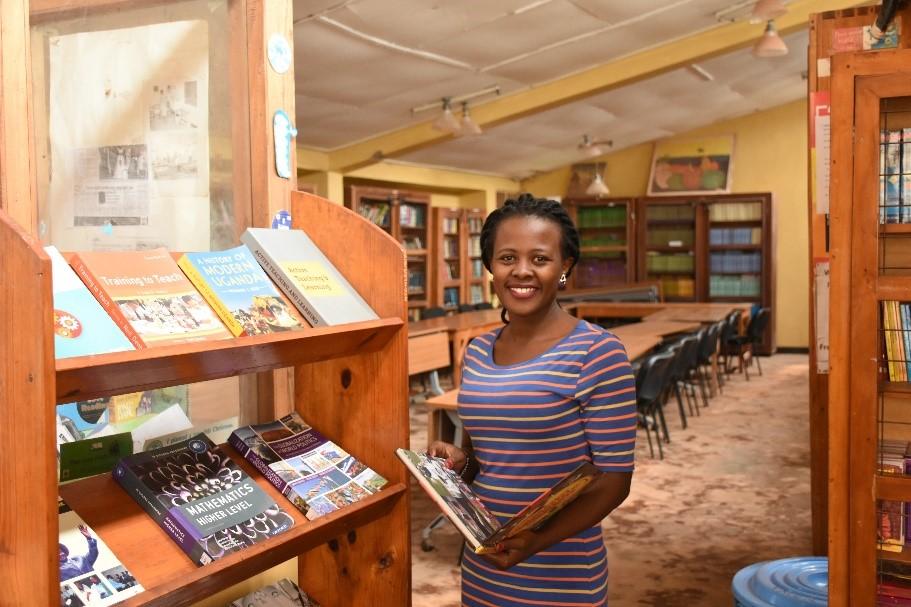
NTC Libraries Re-imagined
Dorothy KYAMAZIMA | 07/08/2019
When you think of college libraries, you probably picture quaint quiet spaces with shelves of dusty books, a librarian and students hunched over their reading material. But this is not the case with the libraries in the National Teachers' Colleges. NTC libraries are doing much more than you think. They are not only about books; their real focus is information. Information is at the very heart of the education system. This is why so much importance has been placed on libraries which have quickly developed into the ideal centres of learning in the colleges. To some, however, these ‘centres of learning' are frozen in time and struggle to meet the ever-growing numbers and needs of its users today. That is why NTC libraries are leaping into the future by creating engaging collaborative spaces and incorporating technology to adapt to this digital era. Susan Owomugisha, a librarian at National Teachers' College Kabale described her first impression of the college library as a place that lacked technology and only had shelves with books and reading spaces. "But today, the library space is changing," she added. "We have computers and the internet where we can access books online. Much of this has been possible with support from Enabel through the Teacher Training Education project that is focused on improving the quality of teaching and learning in the colleges. Through this project, a lot of effort has been made to transform the libraries so that they meet the various demands of its users today. "There is a need to focus on the library user and understand their needs," she says. "Something I never really paid attention to in the beginning. But after going through the online course (Opening the Book), I was able to understand the importance of the library set up. Things like organizing the spaces in the library and accommodating different kinds of users." Information and Communication Technology (ICT) is another important aspect that has been incorporated in the NTC libraries. Libraries now have a computer section to cater for users interested in using the internet. But that is not all, librarians have been supplied with and trained in the use of a library management system known as KOHA. This open-source software has simplified their work in a lot of ways.According to Susan, a lot of the work she did as a librarian was manual and time-consuming. This included registering users, writing stock and preparing reports. "But now with KOHA, I can generate a report, get statics of users, circulate and catalogue books which makes my work a lot easier and faster," she said with a smile. Along with the introduction of KOHA, NTCs received a library kit. This is a set of equipment that included a photocopier, a laminator and a binder. These are things according to her that have helped the college provide better services to its library users. Before, a user would have to exit the library to photocopy pages of a book that they found interesting but now they can easily do so in the library setting without it consuming much of their time. This equipment has also supported the libraries by acting as an income generator. Students pay a minimal fee for services of the binder, laminator and photocopier and this can, in turn, be used to purchase more equipment to enhance the library. To top it all is the construction works at the college. Enabel is supporting the construction of a bigger and better resource centre that can fully encompass collaborative library spaces, increased library stock, the integration of ICT (computers and internet) and provides equipment that not only enhances access to the library but also improves the comfort library user. This she as she calls it, is ‘the library of Tomorrow.' All this is part of Enabel's efforts to improve access and use of information that can improve the quality of teaching and learning in the colleges through user-friendly libraries.
-
Practice Makes Perfect with the Continuous School Practice Pilot System in the National Teachers’ Colleges
Dorothy KYAMAZIMA | 07/08/2019
“My first experience as a teacher was not an easy one. I stood in front of the classroom filled with students and I trembled,” says 20-year-old Gasi Joseline. She is one of the many teacher trainees striving to join the teaching profession by studying a Diploma in Education Secondary (DES) at National Teachers’ College Muni. Today, as she takes her final Examination School Practice, she stands in front of a class of 50 students, confident and full of purpose as her lesson makes for one of the most engaging classes at St. Josephine’s College Ombachi secondary school. When asked how she managed to transform herself from a timid teacher trainee to a more confident and skilled one, she explains, “experience is the best teacher!” This experience came in the form of a pilot system known as Continuous School Practice.While school practice is something that exists in the teaching profession, it is usually something that teacher trainees get very little or no experience of unless in the form of an examination scheduled in the study curriculum known as Examination School Practice. This version of the school practice happens at the end of each year and teacher trainees are graded on their practical teaching skills which they only get to rehearse for the very first time in an actual classroom. Something that the majority of the teacher trainees are not prepared for.This is why Enabel’s Teacher Training Education (TTE) project has introduced a pilot system known as Continuous School Practice that provides teacher trainees with more opportunities to practice their teaching methods and improve their skills before they take on their final Examination School Practice. Continuous School Practice (CSP) provides the much-needed hands-on experience teacher trainees need. This concept of school practice is conducted on a more regular basis and is constructed in a classroom setting where teachers get to interact with actual students and practice their teaching skills.HOW CSP WORKSIn order for this to work, National Teachers Colleges have incorporated the CSP pilot system into the first-year student’s curriculum and created a collaboration with a network of secondary schools surrounding the college. This allows the teacher trainees time and opportunity to get involved in regular school practice.But that is not all. CSP is a progressive system and follows a number of different steps to fully equip teacher trainees with the best practice they can get. The first step is the theory phase which involves methods courses and takes place in the National Teachers’ College. Here, Teacher trainees are introduced to different teaching methodologies that involve positive discipline and learner-centered methodologies such as Active Teaching and Learning (ATL). This is then followed by the observation phase. Teacher trainees at this point observe lessons illustrating the methods courses taught in phase one of CSP. This observation is conducted in both NTCs through demonstration lessons by lecturers and in surrounding secondary schools through classroom observations conducted by teachers. This gives the teacher trainees a chance to reflect on how learner methodologies are implemented in a classroom and from this they develop schemes of work, lesson plans and instructional materials for their lessons also known as teaching portfolios. Once this has been achieved, the teacher trainees’ step into the micro-teaching phase. This phase encourages students to develop specific skills and behaviors by practicing within small groups of their peers at the college and small groups of students at secondary schools. And then comes the final step of CSP; the teaching practice. During this phase, the teacher trainee conducts a lesson in a surrounding secondary school. This is done in the presence of a few of his/her peers and the secondary school teacher in order to provide feedback to their practicing teacher trainee after the session. IMPACT OF CSP So far, approximately 2192 teacher trainees across the 5 National Teachers’ Colleges have undergone the Continuous School Practice system with many attesting to its benefits. Fred Abel, a teacher trainee from NTC Mubende acknowledged that CSP has introduced him to the practical part of teaching and given him the courage to stand before a classroom and teach confidently. Confidence is an important aspect that every teacher must have and this comes with regular teaching practice that the teacher trainees undergo during CSP. However, teacher trainees develop much more than confidence, they develop competence. Joseline an English Teacher Trainee from NTC Muni shared a more about the skills she gained. “CSP gave me the chance to put into practice the Active Teaching and Learning methods that were introduced to us in the College. But you can’t know how these teaching methodologies are applied unless you have practiced it through CSP.” She noted. A recent survey on the progress of this pilot system indicated an improvement in the skills of teacher trainees by evaluating their performance in the Final Examination School Practice that CSP helped prepare them for. More than 50% of the teacher trainees confirmed an improvement in their Final Examination School Practice results with the majority of students scoring a high pass mark between 70-90%. However, CSP is doing much more than preparing teacher trainees for their profession, it is also improving the skills and workmanship of the current teachers. Both teachers and lecturers from partner secondary schools and the National Teachers’ Colleges respectively are adopting the use of teaching portfolios to improve their teaching skills. According to Okumu Benjamin, the Director of studies from Gulu Secondary School, teachers are being challenged to be better and do better. He adds, “There a certain thing I used not to do like keeping a well-organized teaching portfolio. I used to teach with my notes. But today, it feels improper if I have no work plan and my students are learning better because of it.” A teaching portfolio is referred to as a collection of information on teaching responsibilities, goals and achievements and evidence of effective teaching. This portfolio basically acts as a work plan that guides a teacher on how to conduct their lesson in the most effective way. While the goal here, is to improve secondary teacher education, it is worth noting that Continuous School Practice is the missing link in teacher training that helps make the move from theory to practical teaching. It has provided teacher trainees with hands-on experience to build on their teaching skills such as lesson preparation, classroom management, the practice of Active Teaching and Learning and lesson delivery, which are all key to effective teaching and learning.
-
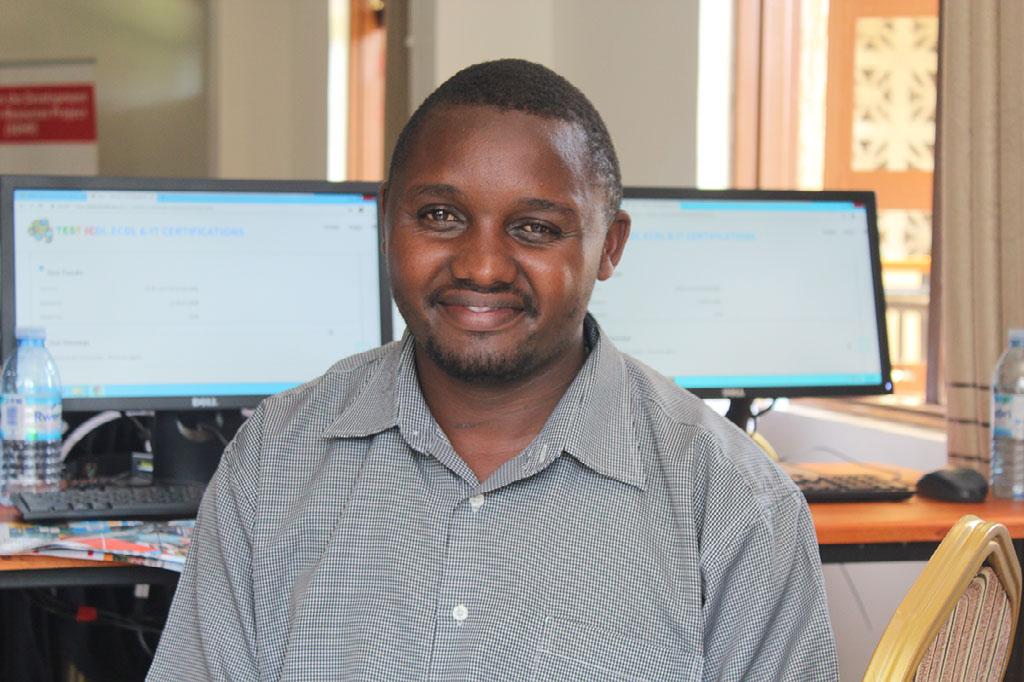
ICT trainings to foster digitalisation for development in the health sector
Rachael AYEBALE | 05/08/2019
Simon Nyakahuma a clinic Officer at Karugutu Health Centre IV had never used a computer. The closest he had been to a computer was at an internet cafe or at the printery, where he would still take his hand written work to be typed and printed for him.So was Elisha Kakongoro, an Anaesthethist officer at the same facility and Katusabe Jane a Nurse at Nyahuka Health centre IV. Karugutu Health Centre IV is located in Ntoroko district and Nyahuka in Bundibugyo district, both facilities located in the Rwenzori region of Uganda.Simon Nyakahuma, a clinic officer from Karugutu HC IVThe needs assessment exercise conducted by the Support to the Development of Human Resources in all its beneficiary organisations identified a great need for skills in ICT and thus procured a training partner Aptech Computer Education, a certified International Computer Drivers License (ICDL) company to deliver these training.A trainer takes the participants through a basic computing trainingThe trainings have been received with great enthusiasm from the recipients. "I have learnt alot in this training. I now understand how to operate a computer from the basics of file management, microsoft word, search engines, creating folders, naming files, saving documents in various formats etc", mentions Simon with a spark of excitement in his eyes."I had never used a computer for serious work," adds Elisha."This exposure will help me know how to use a computer for my work, which will in turn make my work more efficient."Elisha Kakongoro, Anaesthist Officer- Karugutu Health Centre IVJane Katusabe also intimates that she now understands computers and how to operate them. She has learnt the specifics of a computer such as RAM, processors, Microsoft word, excel, power-point etc. She has also learnt basic computer management. "I had never used a computer, I would just see it there and had no idea how it is used," she says.Even when she had a presentation to make, she would always have someone prepare her presentation. Now she happily says," After this training, I will be preparing my own power-point presentations and making my own reports."Jane Katusabe, Nurse- Nyahuka Health Centre IV"We are thankful to the the SDHR project for this thoughtful training. Everyone in the training has their own computer to learn from and the trainer is really patient with us, knowing well that some of us have never used computers. This knowledge is going to take us a long way in transitioning from paper work reports to digital content." Simon concludes.
-
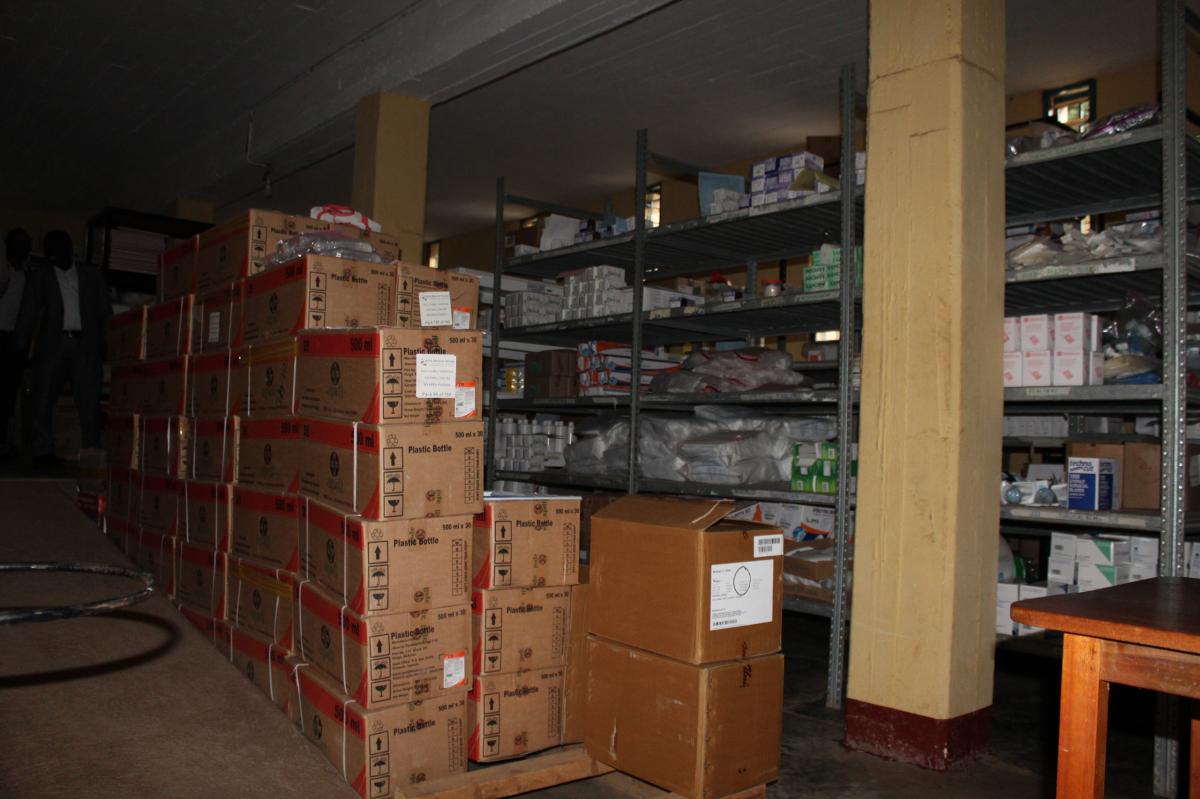
Drug stock outs a thing of the past for Holy Family Hospital Nyapea
Rachael AYEBALE | 05/08/2019
Holy Family Hospital Nyapea is located in the depth of the new Zombo district and has been in existence for over 31 years. This health facility is historically a private not for profit health facility serving the community under the Catholic church. Being nonprofit poses major challenges in running the facility such as, financial inadequacy, inadequate infrastructure, human resources skills gap, drug supplies management and others.Of the above challenges, improper drug supplies management was stifling the facility with drug shortages thus the hospital administrative team decided to sit and review the issues and found that, drug handling personnel lacked proper that led to major stock outs of essential drugs, and thus when the Support to the Development of Human Resources project was carrying out a needs assessment, the hospital administration quickly grabbed the opportunity and prioritized a Supply Chain Management training to assist them close the gap.The training was attended by 17 staf; managers, mid managers and drug handlers in all departments. “After the training we drew an action plan to address our challenge, clearly indicating the action point, performance indicator, and timeline for implementation”, affirms Dr Jammy Omara, a medical officer at the facility and training participant. “I must say the training registered a success as you shall see from our performance indicators” he adds.The facility has been able to adopt a Vital Essential Necessary (VEN) system with a list of essential drugs classified along the system.Unlike in the past when drug orders were uncalculated, now orders are only made for essential drugs. The facility is now able to calculate daily and monthly consumption from the store in a timely manner.Storage of drug has also greatly improved. All drugs are now labelled in the store and organized.They have also acquired shelves, some lockable to better store and protect drugs.They have formed a therapeutic committee that analyses drug usage, cost analysis reports, benefits analysis for drug accountability purposes.Dr Mark Bramali, also a medical officer and participant in this training confirms that they have been able to reduce drug stock outs to 11% from 36%. He asserts that even the 11% would be much less if it weren’t for situations beyond their control such us delayed delivery schedules of the suppliers.To further address the issue of drug stock outs, they now order for essential drugs that are running our early enough, as early as 2 weeks to stock out in projection of the ones in the store. Thus they have been able to save about 14 million per year on drugs wasted, which to a facility that operates on a very small budget is substantial money.Kafeero Ibrahim, a registered nurse and participant of the Supply Chain training confirms that there has been a great improvement in drugs storage, drug stock outs have reduced significantly, there is now prioritization of drugs procured, and dispensing log books are now in place and regular updates of drug stock cards to estimate drug usage.In conclusion, Dr Jammy mentions he on behalf of Holy Family hospital Nyapea is very grateful to Enabel for helping them close this gap that was stifling their facility.” We are glad Enabel did not force a training on us that may have perhaps been irrelevant to our needs. They came and assessed our needs and gave us an opportunity to identify and prioritise our own needs that we urgently needed training in. The trainer brought us did not disappoint and Holy Family Nyapea hospital is now on track as far as stocking essential drugs is concerned.’’
-
Uganda National Meteorological Authority (UNMA) boosted by Aeronautical meteorology training
Rachael AYEBALE | 05/08/2019
The department provides these services to both local and International flights that use Uganda’s air space with their main client being Civil Aviation Authority.Air transport safety, efficiency, and regularity while assessing environmental risks and protection, as well as extreme weather conditions are an agenda of the UNMA aeronautical department. So is supporting search and air rescue operations.This is done by providing vital weather information during takeoff, mid-flight and landing of airplanes as well as during searches in both, marine and aviation accidents.Now, if you have been to Entebbe International airport, you know that it hosts several aircraft from large cargo air buses, passenger jets and private air planes on a regular basis.The department for so long needed to comply to the international aeronautical weather reporting standards (ISO 9001:2015) and the need to bridge this gap was identified during the Support to the Development of Human Resources project needs assessment exercise conducted in all beneficiary organizations, prompting a training in Aeronautical Meteorology.You probably know that weather contributes to 90% of all air related accidents. This means that the aeronautical meteorology department of any given country will be the first suspect in any air related accident. The department therefore must be on their guard and meet International standards of weather reporting in the aviation industry.This training came handy in awakening the officer’s minds to the fragility of the department they work in and how crucial it is that they report accurate weather readings.The quality of weather reports developed by the department has since significantly improved.“We used to take certain issues for granted such as temperature reading. From the training, we realized how important this is for pilots and now we are very vigilant while reading and reporting temperatures of any given area,” Peter Latiko, a forecast officer says.They are now also extremely careful and accurate while reporting cloud cover. Peter intimates, “We ensure we check with the satellite cloud imagery being captured at that particular time to make sure it corresponds with what our readings say,” he adds.Often time’s clouds can cause significant discomfort and even damage to an aircraft if not reported to the pilots accurately. As Joan Birungi, also a forecast officer confirms, “Cumulo nimbus clouds are a very dangerous cloud for air crafts. They are heavy with water and ice that can easily enter the plane engine hence causing the plane to burn a lot more fuel, turbulence and in worst cases even engine failure, etc.”Teddy Tindamanyire, the UNMA director for Training and research is glad to mention how this training helped them structure better their department and she mentions, "We now have staff specializing in specific areas. We have observers, forecasters and reporters, each working only in a specific channel of weather communication”.Yusuf Nsubuga, a forecast officer adds, “Before this training, we were doing general forecasting. Each of us would work in any department, ranging from the observatory, communications, and forecasting.”“But now, each of us is specialized in a particular department paying close attention to the areas very vital to air craft smooth running in our air space,” he adds.After this training, a competence assessment was carried out on the staff and James Nantulya the head of communications department mentions, “We are proud to say that this time round 64% of staff passed the assessment compared to the 38% the last time we had an assessment done.”“Thank you Enabel for supporting us with this training.” He addsThe department has also earmarked visibility reference points as per the trainings action plans that had never been in place. These are GPS points’ that help a pilot know the distance for takeoff and landing.Now the Entebbe International airport can operate like any other international airport with all the necessary support from the meteorology department.Where do they see UNMA aeronautical meteorology in 10 years?“We hope to have more competent specialized staff on the team. We also hope to re-tool. That will mean we can then meet an increased demand from clients as the Uganda International airport traffic is growing significantly over the years. Teddy mentions.“We also hope to expand to other aerodromes in Uganda as now we only have weather forecasting at Entebbe and Soroti only.’’ She adds.
